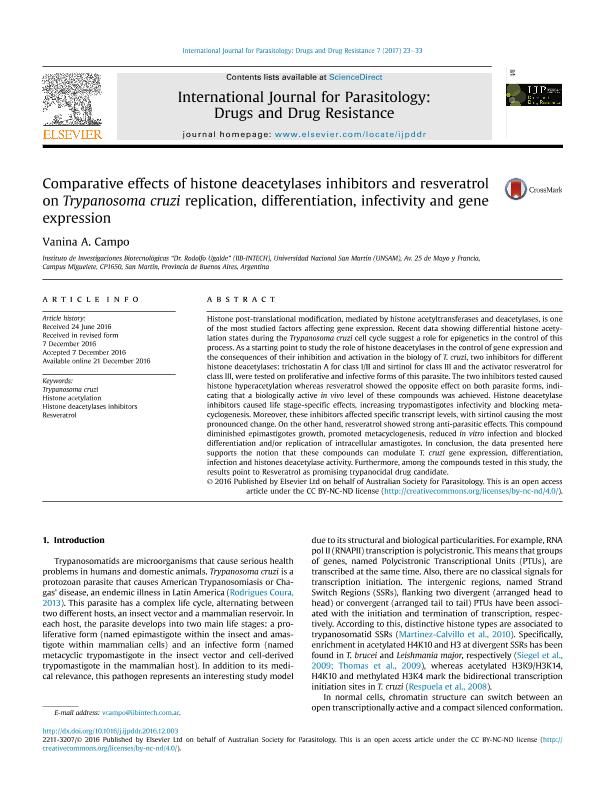Mostrar el registro sencillo del ítem
dc.contributor.author
Campo, Vanina Andrea

dc.date.available
2018-06-21T12:39:47Z
dc.date.issued
2017-04
dc.identifier.citation
Campo, Vanina Andrea; Comparative effects of histone deacetylases inhibitors and resveratrol on Trypanosoma cruzi replication, differentiation, infectivity and gene expression; Elsevier; International Journal for Parasitology: Drugs and Drug Resistance; 7; 1; 4-2017; 23-33
dc.identifier.issn
2211-3207
dc.identifier.uri
http://hdl.handle.net/11336/49502
dc.description.abstract
Histone post-translational modification, mediated by histone acetyltransferases and deacetylases, is one of the most studied factors affecting gene expression. Recent data showing differential histone acetylation states during the Trypanosoma cruzi cell cycle suggest a role for epigenetics in the control of this process. As a starting point to study the role of histone deacetylases in the control of gene expression and the consequences of their inhibition and activation in the biology of T. cruzi, two inhibitors for different histone deacetylases: trichostatin A for class I/II and sirtinol for class III and the activator resveratrol for class III, were tested on proliferative and infective forms of this parasite. The two inhibitors tested caused histone hyperacetylation whereas resveratrol showed the opposite effect on both parasite forms, indicating that a biologically active in vivo level of these compounds was achieved. Histone deacetylase inhibitors caused life stage-specific effects, increasing trypomastigotes infectivity and blocking metacyclogenesis. Moreover, these inhibitors affected specific transcript levels, with sirtinol causing the most pronounced change. On the other hand, resveratrol showed strong anti-parasitic effects. This compound diminished epimastigotes growth, promoted metacyclogenesis, reduced in vitro infection and blocked differentiation and/or replication of intracellular amastigotes. In conclusion, the data presented here supports the notion that these compounds can modulate T. cruzi gene expression, differentiation, infection and histones deacetylase activity. Furthermore, among the compounds tested in this study, the results point to Resveratrol as promising trypanocidal drug candidate.
dc.format
application/pdf
dc.language.iso
eng
dc.publisher
Elsevier

dc.rights
info:eu-repo/semantics/openAccess
dc.rights.uri
https://creativecommons.org/licenses/by-nc-nd/2.5/ar/
dc.subject
Histone Acetylation
dc.subject
Histone Deacetylases Inhibitors
dc.subject
Resveratrol
dc.subject
Trypanosoma Cruzi
dc.subject.classification
Otras Ciencias Biológicas

dc.subject.classification
Ciencias Biológicas

dc.subject.classification
CIENCIAS NATURALES Y EXACTAS

dc.title
Comparative effects of histone deacetylases inhibitors and resveratrol on Trypanosoma cruzi replication, differentiation, infectivity and gene expression
dc.type
info:eu-repo/semantics/article
dc.type
info:ar-repo/semantics/artículo
dc.type
info:eu-repo/semantics/publishedVersion
dc.date.updated
2018-06-19T16:52:21Z
dc.journal.volume
7
dc.journal.number
1
dc.journal.pagination
23-33
dc.journal.pais
Países Bajos

dc.journal.ciudad
Amsterdam
dc.description.fil
Fil: Campo, Vanina Andrea. Consejo Nacional de Investigaciones Científicas y Técnicas. Centro Científico Tecnológico Conicet - La Plata. Instituto de Investigaciones Biotecnológicas. Universidad Nacional de San Martín. Instituto de Investigaciones Biotecnológicas; Argentina
dc.journal.title
International Journal for Parasitology: Drugs and Drug Resistance
dc.relation.alternativeid
info:eu-repo/semantics/altIdentifier/doi/https://dx.doi.org/10.1016/j.ijpddr.2016.12.003
dc.relation.alternativeid
info:eu-repo/semantics/altIdentifier/url/https://www.sciencedirect.com/science/article/pii/S2211320716300574
Archivos asociados
